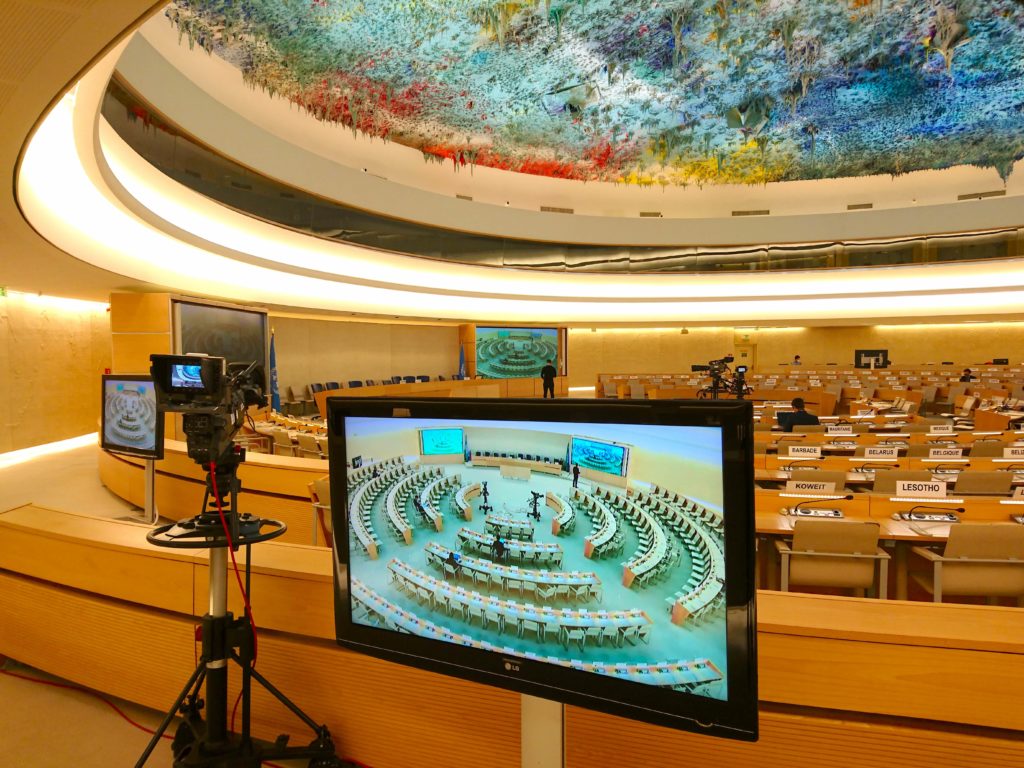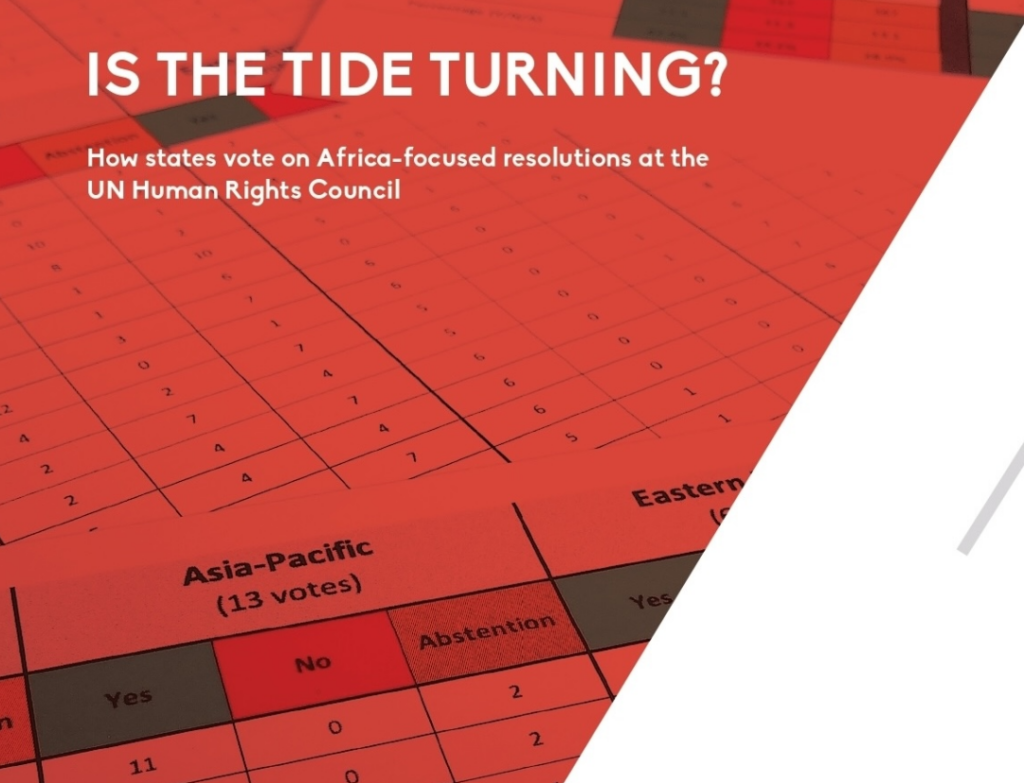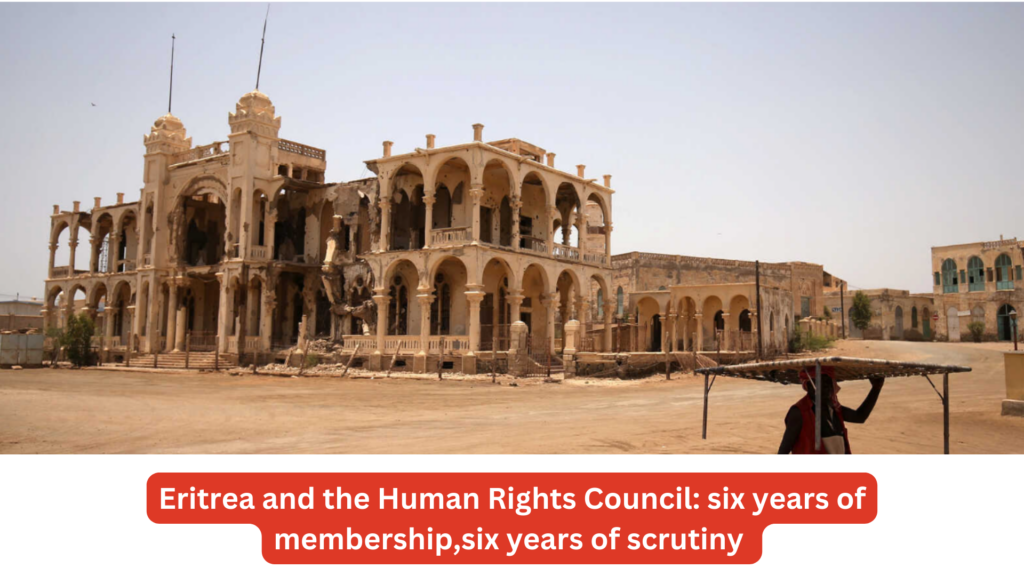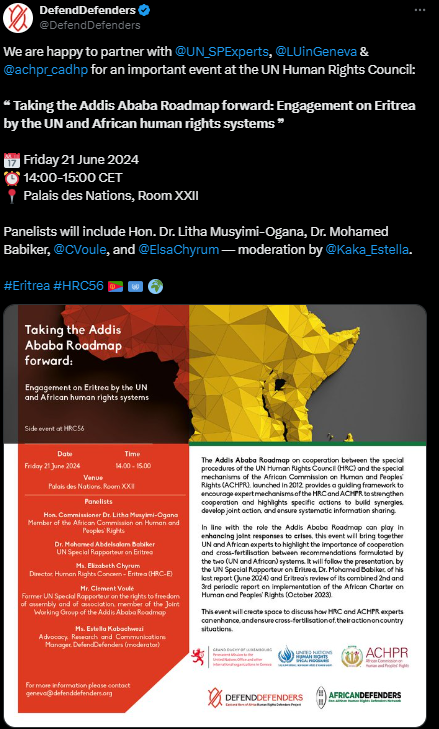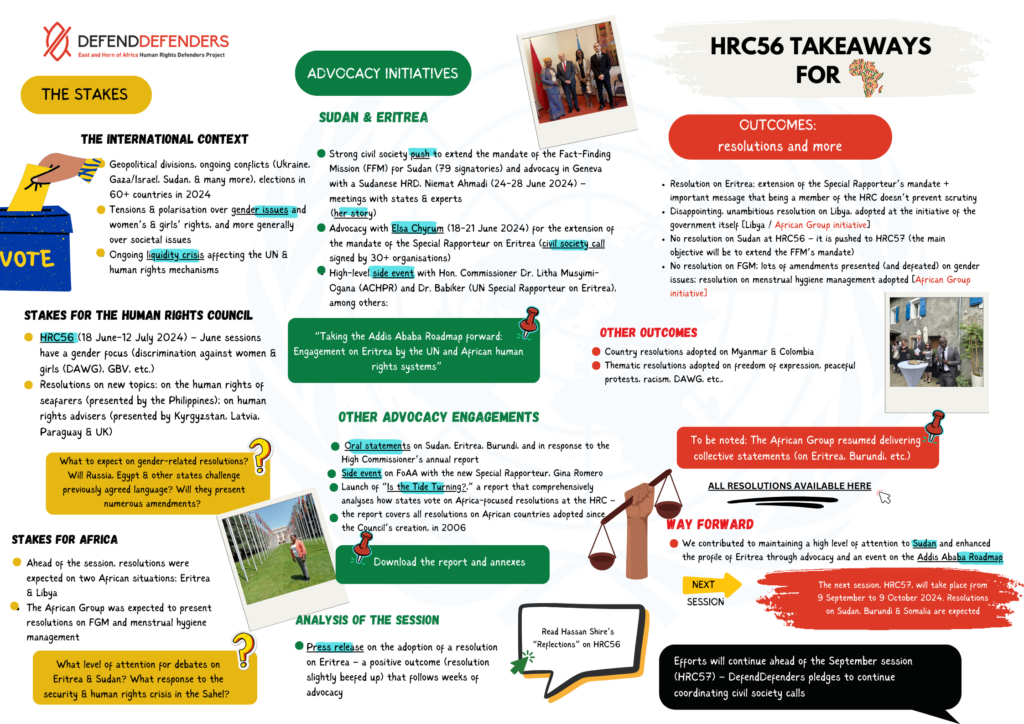The UN Human Rights Council’s (HRC) 56th session (HRC56) was marked by division. Against a backdrop of attacks on multilateralism and accusations/counter-accusations of “double standards,” debates saw an increase in polarisation. In both thematic and country-specific debates, geopolitical blocs opposed one another with no possibility of compromise. Even previously agreed language (for instance, on gender equality and women’s and girls’ rights) was challenged.
The result is an increase in the duration of negotiations, in the number of amendments presented, and in the share of resolutions that are put to a vote. As human rights crises multiply worldwide, and conflicts rapidly deteriorate, countries are less and less able to talk to one another and reach negotiated outcomes. This threatens to undermine the HRC’s effectiveness and its ability to address key human rights issues.
This was clear for thematic resolutions – June sessions being usually focused on gender issues. This was also clear for country-specific resolutions. Confirming the patterns presented in our latest report, “Is the Tide Turning?,” which comprehensively analyses Africa-focused resolutions adopted since the Council’s creation, in 2006, the annual resolution on Eritrea was adopted by vote, once again (as opposed to being adopted by consensus). Other debates on African country situations were tense, pointing to difficult battles in future sessions.
Sudan: action postponed to the September session
Building on the collective win of October 2023, when the HRC established a Fact-Finding Mission (FFM) for Sudan after a massive civil society push, a large group of NGOs led by DefendDefenders pushed for the extension of the FFM’s mandate.
As the armed conflict that broke out in the country on 15 April 2023 continues unabated, with risks of further sexual and ethnic-based atrocities, it is essential to place accountability at the centre of any solution to the crisis. If impunity is allowed to continue, cycles of violence will recur in Sudan. Referring to both the situation on the ground and the UN’s liquidity crisis and its consequences (including the FFM’s under-staffing), the signatories proposed a mandate extension in July, at HRC56, instead of the initially expected HRC57 (October 2024). The aim was to allow the FFM to have a clear vision of its future and continue its investigative work.
Action, however, is deferred to HRC57 (9 September-9 October 2024). During the summer, we will remain mobilised and reach out to states to make the case for the FFM. During HRC56, we kicked off these efforts with a Sudanese human rights defender (HRD), Niemat Ahmadi, who was with us in Geneva. With the support of our team, Niemat, who is the founder of the Darfur Women Action Group (DWAG), met with a broad range of stakeholders to brief them on the situation in Sudan and Darfur.
Sudan must not be allowed to become a forgotten crisis. It must remain a priority for the international community, and we will do our utmost to contribute to a meaningful response by UN human rights bodies.
Eritrea: six years of membership, six years of scrutiny
When Eritrea became a member of the HRC, on 1 January 2019, many observers were appalled. It is difficult to imagine a country more ill-suited to join the UN’s top human rights body. Beyond its dismal human rights record, including the fact that, according to the Commission of Inquiry (COI) on Eritrea, there are “reasonable grounds to believe” that crimes against humanity have been committed in the country since 1991, the Eritrean government has refused to engage in any way with the Council’s mechanisms, including the COI and successive Special Rapporteurs (SRs).
Throughout Eritrea’s first (2019-2021) and then second membership term (2022-2024), however, Eritrean HRDs remain mobilised. DefendDefenders continued to coordinate civil society advocacy at the HRC, including by leading on joint letters. The last iteration makes clear that no progress can be recorded in Eritrea.
But adopting short, “procedural” resolutions is not good enough. As the signatories wrote, “[r]esolutions on Eritrea should fully and accurately reflect the country’s human rights situation.” “They should provide a framework for discussion about human rights in Eritrea, including the domestic situation and its impact abroad,” including extraterritorial attacks against the Eritrean diaspora. It is in this spirit that we advocated for a beefed up resolution. The result is half-satisfying: the new resolution on Eritrea departs from a completely unambitious approach while extending the SR’s mandate, but it remains below our expectations.
We did achieve two things though. First, we contributed to maintaining scrutiny of Eritrea. Doing so, we proved that membership is not a shield against scrutiny. This is an important message to states that seek to join the HRC to whitewash their human rights record. Second, we enhanced the profile of Eritrea. With Elsa Chyrum, Director of Human Rights Concern – Eritrea (HRC-E) and a founder of DefendDefenders, we met with states and experts to outline the role of the Council in addressing the situation. We also held a high-level event on the Addis Ababa Roadmap and Eritrea (see below).
Events and launches
The Addis Ababa Roadmap on cooperation between the special procedures of the HRC and the special mechanisms of the African Commission on Human and Peoples’ Rights (ACHPR) provides a guiding framework to encourage experts of the two systems to strengthen cooperation and highlights specific actions to build synergies, develop joint action, and ensure systematic information sharing. In line with the role the Roadmap can play in enhancing joint responses to crises, with the office of the SR on Eritrea, we organised an event focused on the country. It brought together the SR, Dr. Mohamed Babiker, a member of the ACHPR, Hon. Commissioner Dr. Litha Musyimi-Ogana, Clément Voulé, the former UN SR on freedoms of peaceful assembly and association, and Elsa Chyrum.
After this discussion in Geneva, we will continue to bring together UN and African experts to further operationalise the Addis Ababa Roadmap. This could be in the form of events at both HRC and ACHPR sessions, on both thematic and country-specific issues.
HRC56 was a busy session for us. In addition to advocacy on Sudan, Eritrea, to high-level engagements, and to the launch of our last report, we welcomed the new UN SR on freedoms of peaceful assembly and association, Gina Romero, and participated in a reception and a side event. We will work with Gina in the next six years to make sure the right to peacefully assemble and to associate is upheld on the African continent.
Other initiatives
A large number of thematic resolutions were adopted at HRC56. Beyond the gender-related initiatives (discrimination against women and girls, menstrual hygiene management, HIV and AIDS, technology-facilitated gender-based violence), the session saw resolutions on freedom of opinion and expression, peaceful protests, racism, climate change, as well as on new topics – the human rights of seafarers, for instance, or human rights advisers.
Reflecting geopolitical divisions, but also as a result of tactics by hardliners within the Organisation of Islamic Cooperation (OIC), a problematic draft resolution on “countering religious hatred” was presented before being then withdrawn at the last minute. It focused on the desecration of holy books and religious symbols, rather than on discrimination and violence against individuals. Together with partners, we emphasise that any prohibition on blasphemy is fundamentally incompatible with the right to free expression. The “defamation of religions” agenda, which experts deemed incompatible with international human rights standards, was replaced with the consensual “16/18” resolution in 2011. Consensus should remain on this and on freedom of religion or belief resolutions.
HRC57: a heavy session for African files
The Council’s 57th session (9 September-9 October 2024) will be heavy for Africa. Beyond the resolution on Sudan, we expect resolutions on Burundi and Somalia. These two situations need continued attention by the UN’s top human rights body.
Our team, together with HRDs from the countries concerned, will be fully focused on our objectives (meaningful resolutions), which serve our long-term goal and vision: A region in which the human rights of every individual as stipulated in the Universal Declaration of Human Rights are respected and upheld.
Hassan Shire
Executive Director , DefendDefenders & Chairperson, AfricanDefenders
Oral Statements
Letters and Statements
Reports
Press Release
Side Events
Resolutions
- Eritrea
- Freedom of opinion and expression
- Peaceful protests


